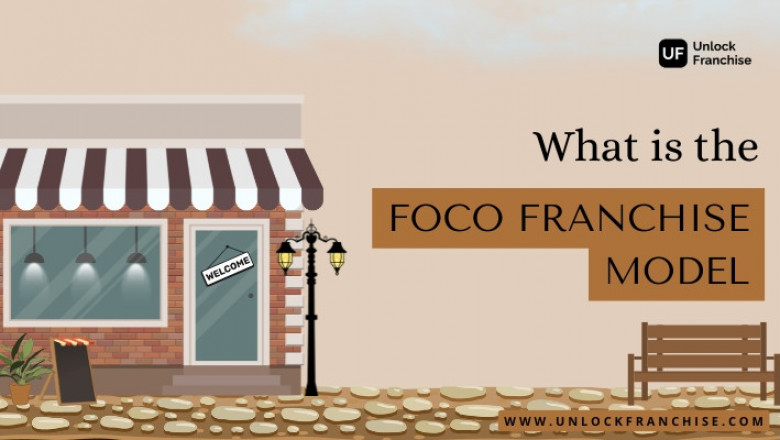views
What is the FOCO Franchise Model
FOCO stands for Franchise Owned Company Operated and it is a franchise model that is preferred globally as well as in India to expand the business and take the business to new heights.
It is nothing new but just an innovative approach towards business and the main reason it ha gained popularity is due to its balanced approach towards risk sharing and profitability.
This model grabs the attention of young entrepreneurs who want to open a franchise but do not want to manage day-to-day operations.
This study explains everything about FOCO from how it works, benefits, challenges, and also why it could be the best deal for you.
What is FOCO Franchise Model?
FOCO stands for franchise owned company operated and in this model, the franchisee owns the franchise outlet and bears all the initial investment and setup cost, while the parent company handles all the day-to-day operations, management, and staffing.
Unlike other business models where a person has to be involved in running all the day-to-day operations, it is a great option for people looking to invest their money and generate passive income.
The franchisor being very experienced in the particular industry, runs the whole outlet and shares the profit ratio of the revenue with the franchisee.
How Does it Work (FOCO)?
To understand this franchise model let's break it down into key components and then make it easier for you to understand what actually FOCO is.
1. Ownership
A. Franchisee’s Role - The franchisee is the owner of the franchise outlet and they bear all the initial investments such as property acquisition, initial inventory, and infrastructure setup.
B. Franchisor’s Role - The franchisor having experience of the industry, operated the whole outlet on behalf of the franchisee. They manage all the staffing, sales, marketing, and all the day to day operations.
2. Revenue Sharing
In most FOCO cases, the franchisor and the franchisee agree on a revenue-sharing model which generally is that the franchisee receives a proportion of the outlet's revenue or profits which ensures a steady return on investment for the franchisee.
A. Fixed Returns - It is a predefined and pre-agreed monthly payout, regardless of the outlet’s performance.
B. Variable Returns - Its a percentage of the outlets revenue or profits but it is based on the performance of the outlet.
3. Initial Investment
The franchisee is responsible for the initial investment which includes.
1. Franchise fee paid to the franchisor
2. Infrastructure setup, equipment and interiors.
3. Licensing , permissions and initial inventory.
4. Operational Control
A. The franchisor handles recruitment, training and marketing as well as other day to day operations.
B. The franchisee has minimal involvement and it does not align to any financial monitoring or strategic decisions.
Benefits of FOCO
1. Passive Income Opportunity
Franchisees do not need to manage any day-to-day operations or take any stress so its best for people with investments who want to generate passive income. One can focus on their work and earn passive income through FOCO.
2. Experts
The franchise outlet is managed by the parent company which has all the technology, equipment, expertise and they ensure proper professional management for the outlet. This directly minimizes the operational efficiency.
3. Reduces Burden
The franchisee is relieved of tasks such as staffing, training, and inventory management which can be time-consuming and complex.
4. Revenue Assurance
With fixed shares or revenue sharing models the franchisee already predicts the income due to the previous data company holds. This reduces financial uncertainty.
5. Brand Leverage
The franchisee automatically gets benefited from the brand value, loyal customer base and marketing efforts that the brand puts for their success.
Challenges for FOCO
1. Limited Control
The franchisee has very little or no control over the day to day operations whereas if the franchisor fails to manage the outlet properly, it can impact our returns.
2. Fixed Return Risk
In a fixed return model, if the franchise outlet underperforms it would be very difficult for the franchisor to meet the guaranteed payouts leading to financial disputes.
3. High Investment
The franchisee bears the initial cost which can be huge in some franchises which require very large area or are already expensive brands in which the inventory cost is also very high.
4. Dependence on the Franchisor
The success of franchise outlet totally depends upon the franchisor’s operational expertise and their marketing strategies which can be doubtful sometimes.
5. Financial Disputes
Differences may arise over revenue sharing calculations especially if transparency is not maintained by the franchisor or anything lacks in the financial report.
FOCO in Different Industries
1. Food and Beverage - Brands such as KFC, Mcdonalds, and Subway offer FOCO Franchise Model in which the franchisee can benefit of the experience and expertise of the brand.
2. Healthcare and Wellness - Pharmacy chains and fitness centers such as Apollo Pharmacy and Anytime Fitness frequently adopt this model.
3. Hospitality - Hotels and resorts often opt for the FOCO model so that they attract investors while ensuring consistency in work and service standards.
4. Retail - Major retail chains such as Reliance Trends, MORE use FOCO models so that they can benefit the franchisee and also maintain operational control.
Conclusion
This was a small guide to FOCO (franchise-owned company operated ) and we discussed how it works, its benefits, and its challenges, this model can be the best for people who have capital and are looking to invest somewhere for passive income.
As the franchisee has zero involvement in operations, one can opt for this method and gain money depending on the outlet's response.
This model has gained a lot of popularity among young age entrepreneurs who are looking for passive income and generate their main income through different sources.
After reading you may have got an idea whether this method works for you or not, decide accordingly and figure out what’s best for you.
Also Read: Can you Run a Franchise Part-Time?






















Comments
0 comment